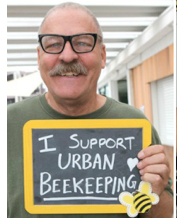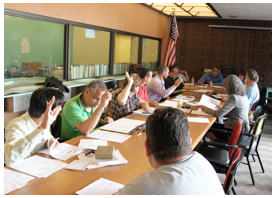CommentsFind Your Neighborhood Council, Find Your Voice Here.
GET INVOLVED--This is a message to all residents of the City of Los Angeles, urging you to participate in your local neighborhood council. It is a chance for you to have an influence on the choices that your city government makes, such as the way that spending is divided among things like road repairs, parks, or public safety. (Photo above: Sunland Tujunga Neighborhood Council raising its voice.)
The following will explain what the neighborhood councils are, what they have accomplished so far, and how you, as a resident of the city, can participate. Your participation provides a chance for you to have a say in everything from excess commercial development to emergency preparedness. It's an opportunity to communicate your concerns directly to City Hall.
This message is particularly timely because neighborhood councils will be electing board members over the next few months. If you act now, you may be able to run for a seat on the governing board of your own neighborhood council. Even if you don't choose to run for a board seat, you have the right to vote for candidates who you think can best represent the interests of your district.
Local neighborhood councils were created as the response to a crisis
 As the 1990s drew to a close, city residents felt distanced from their own government and neglected by City Hall. It shouldn't have been surprising. This is a city of 4 million people divided into the relatively small number of 15 City Council districts. That means that each City Council district has more than a quarter of a million residents. It's hard for the elected City Council representatives to keep in touch with even a fraction of their constituents.
As the 1990s drew to a close, city residents felt distanced from their own government and neglected by City Hall. It shouldn't have been surprising. This is a city of 4 million people divided into the relatively small number of 15 City Council districts. That means that each City Council district has more than a quarter of a million residents. It's hard for the elected City Council representatives to keep in touch with even a fraction of their constituents.
Political tensions increased due to the existence of well organized secession movements. The city of Los Angeles could have been dismantled. Our elected officials agreed that something had to be done. In 1999, amendments to the City Charter were put on the ballot and passed by vote of the people of Los Angeles.
The amended Charter established the right of the people to create and run their own local neighborhood councils.
Beginning in 2001, the city has established 96 local neighborhood councils. They are places where you and your neighbors can meet in order to discuss your mutual concerns.
How does the system work? How do I find my own neighborhood council?
Finding your neighborhood council is actually quite easy. You can go directly to this web page and type in your address. By the way, this link gives you lots of other information, including the day that trash is collected, the name of your cable TV provider, and the identities of your elected officials from the City Council up to the US Congress.
What do neighborhood councils do?
Neighborhood councils were created to hear from the public and to advise our elected officials as to what you, the people, think about important issues. You might think of them as the peoples' lobby.
The scope of interest is basically everything that affects our lives, our property, and the neighborhoods in which we live. Do we have any thoughts about the proposed construction of a new high rise? How about proposed changes to the runways at LAX? You name it and we have probably considered it or will consider it.
Neighborhood councils are also empowered to evaluate the functioning of city departments and agencies. For example, how is the Department of Recreation and Parks doing in managing and maintaining the parks within your district? How well does city government respond to complaints about potholes?
Neighborhood councils function through elected boards
 Each neighborhood council elects a governing board that oversees the actions of the council. It collects public opinion and transmits the findings to the local City Council representative. In this way, the elected officials get a better idea of what their constituents are concerned about.
Each neighborhood council elects a governing board that oversees the actions of the council. It collects public opinion and transmits the findings to the local City Council representative. In this way, the elected officials get a better idea of what their constituents are concerned about.
(Photo right: Echo Park Neighborhood Council in action.)
Governing boards also decide how to spend the money provided by the city. This year, each neighborhood council will have $42,000 to spend. It can be used for routine expenses including advertising its existence to the public, or to support local events such as a community fair, or to support good causes such as the local shelter for battered women. Most neighborhood council governing boards divide their expenditures among all these categories.
You have a part in electing the local neighborhood council board
This is important. Your local neighborhood council will probably be holding an election fairly soon to choose the members of its governing board. You will have the chance to vote for candidates of your choice or even to be a candidate for a board seat. The city agency in charge of neighborhood councils known as EmpowerLA has created a web page that explains the election process [http://empowerla.org/elections/] and provides links to detailed information about all aspects of the process. For example, if you go to that web page and click on the link called About Councils, you will find a detailed explanation of the system that goes beyond this summary.
Eligibility to vote and be a candidate
The City Charter amendment that established the neighborhood council system established that anyone who lives, works, or owns property in a neighborhood council district should be eligible to participate. The Los Angeles City Council has extended that definition to include people who have some other stake in the community, such as being a member of an organization that has a presence there. Most neighborhood council participants are residents or business owners within the district, but the law protects your right to participate if you satisfy one of the other qualifications.
Accomplishments of the neighborhood council system
Neighborhood councils are involved in land use decisions all over the city. Applications for zoning variances, liquor licenses, and all manner of road repair problems are brought before neighborhood council boards. In the harbor area, land adjacent to the docks and channels has been turned into parks and recreational areas, something that would have cost tens of millions of dollars had they been attempted by private parties.
One of the important successes of the neighborhood council system is its creation of a link between the LAPD and city residents. The LAPD's Senior Lead Officers routinely attend neighborhood council meetings all over the city. This has provided better communication and mutual understanding between the people of the city and its police department.
The neighborhood council system is currently working to bring the public into emergency preparedness as a critical element of disaster response. You can read about it in City Watch.
Neighborhood councils have also been able to provide seed money for local cultural organizations and for organizations that help people to find jobs or simply to come in out of the cold.
These are just a few of the accomplishments. You can hear more about what neighborhood councils have done and have yet to do by attending your local meeting.
* Find your Neighborhood Council, Find Your Voice here.
(Bob Gelfand writes on culture and politics for CityWatch. He can be reached at [email protected])
-cw
















